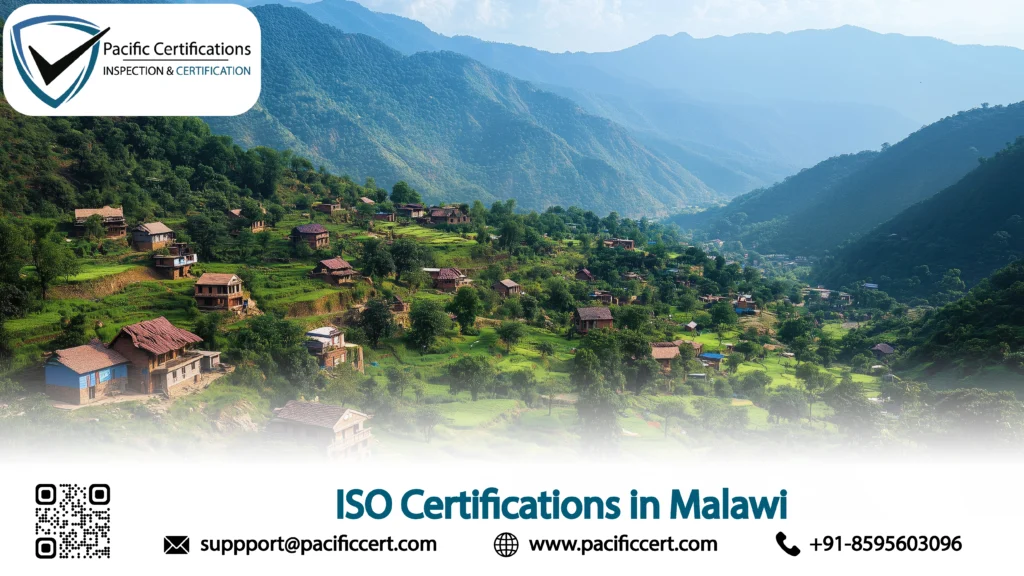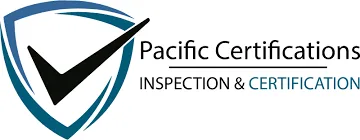
Introduction
Malawi’s economy centers on agriculture (tobacco, tea, sugar, maize), manufacturing (food processing, textiles), mining (rare earths, graphite, gemstones) and emerging tourism, with agriculture employing 80% of the workforce and contributing 25–30% of GDP. As export markets in EU, US and SADC demand certified quality, safety and traceability in 2026–2027, ISO certification Malawi gives tobacco processors, tea estates, sugar mills, food manufacturers, mining firms and service providers structured proof of controlled operations.
For agribusinesses, ISO 9001 certification Malawi and ISO 22000 certification Malawi support consistent processing, HACCP controls and export compliance. Mining and manufacturing operations turn to ISO 14001 certification Malawi and ISO 45001 certification Malawi to address environmental impact and strengthen worker safety systems. Growing digital services and NGOs rely on ISO 27001 certification Malawi to anchor data security across platforms and sensitive information flows.
Share your scope with Pacific Certifications and get accreditation coverage, audit days and Stage 1/2 timelines tailored to harvest seasons, mining cycles or project milestones. We help get ISO certified in Malawi for single sites or multi-location operations.
Economic context and industry overview
Agriculture drives Malawi’s economy through 2026–2027, with tobacco (world’s 4th largest producer), tea, sugar, maize and cotton as key exports, while food processing, textiles and light manufacturing add value. Mining is projected to grow from 1% to 12% of GDP by 2027, with rare earths, graphite and gemstones targeting global supply chains. Tourism, energy and digital services are emerging, supported by infrastructure improvements.
Across these, ISO 9001 certification Malawi, ISO 22000 certification food processing Malawi, ISO 14001 certification Malawi and ISO 27001 certification Malawi are key for vendor lists, export approvals, financing and donor requirements.
Why ISO certifications matter in Malawi?
International buyers, regulators, banks and donors seek evidence of systems with traceable records. ISO certification Malawi accelerates RFPs, passes exporter audits and stabilizes operations during dry seasons or power outages.
For factories, estates and service providers, ISO 9001 certification Malawi strengthens processing control, complaint handling and continual improvement. Agriculture teams benefit from ISO 14001 certification agriculture Malawi, which guides sustainable soil, water and waste management. Safety improves in mines, mills and workshops when organizations adopt ISO 45001 certification manufacturing Malawi.
Food exporters rely on ISO 22000 certification Malawi and HACCP certification food industry Malawi to ensure traceability and meet market requirements.
Meanwhile, ISO 27001 certification Malawi secures data for NGOs, fintech firms and government services handling sensitive information. Local SMEs also gain visibility in supply chains through ISO certifications for small business Malawi.
Popular ISO standards in Malawi
| Industry focus | Commonly requested standards | Why they matter |
| Tobacco, tea, sugar processing | ISO 9001, ISO 22000, ISO 14001, ISO 45001 | Quality, food safety, environment, worker-safety for exports |
| Maize milling, food & beverages | ISO 22000 certification food processing Malawi, ISO 9001, HACCP | HACCP, traceability, export approval, hygiene |
| Mining (rare earths, graphite) | ISO 14001, ISO 45001, ISO 9001 | Environmental compliance, safety, quality control |
| Textiles & manufacturing | ISO 9001 certification manufacturing Malawi, ISO 45001, ISO 14001 | Consistent production, safety, sustainability |
| NGOs, fintech, digital services | ISO 27001 certification Malawi, ISO 22301, ISO 9001 | Data security, continuity, service quality |
| Tourism & hospitality | ISO 9001, ISO 22000, ISO 14001 | Guest quality, food safety, eco-tourism |
Agriculture drives ISO 9001 certification agriculture Malawi and ISO certification tobacco industry Malawi for export compliance.
ISO Certification process in Malawi
Start from current operations in processing plants, estates, mines or offices. How to get ISO certified in Malawi:
- Management Decision & Scope Definition: Top management commits to ISO certification and defines the scope, objectives, and applicable ISO standard.
- Gap Analysis / Readiness Assessment: Existing practices are reviewed against ISO requirements to identify gaps needing correction before audits.
- System Development & Implementation: Required policies, procedures, controls, and records are developed and implemented across operations.
- Training & Awareness: Employees are trained to understand ISO requirements, roles, responsibilities, and operational controls.
- Internal Audit: An internal audit is conducted to verify system conformity and identify nonconformities or weaknesses.
- Management Review: Top management reviews audit results, performance data, risks, and improvement actions.
- Selection of Certification Body: An accredited ISO certification body is selected to conduct independent third-party audits.
- Stage 1 Audit (Documentation & Readiness Review): The certification body reviews documented systems and confirms readiness for full certification audit.
- Stage 2 Audit (Certification Audit): On-site or remote audit verifies effective implementation and compliance with ISO requirements.
- Corrective Actions & Certification Decision: Identified nonconformities are corrected, reviewed, and approved for certification issuance.
- Certificate Issuance: ISO certificate is issued, valid for three years, defining scope and standard.
- Surveillance Audits: Annual surveillance audits ensure continued compliance and system effectiveness.
- Recertification Audit: A full reassessment is conducted at the end of the certification cycle to renew certification.
What are the requirements for ISO certifications in Malawi?
ISO certifications in Malawi require organizations to establish, implement, and maintain a structured management system that meets internationally accepted ISO standards. The following points outline the general baseline requirements that organizations must fulfill before and during ISO certification audits in Malawi:
- The organization must clearly define the activities, locations, products, and services included in the certification scope.
- Top management shows leadership, takes accountability, and supports the ISO management system.
- Teams establish relevant ISO policies, set measurable objectives, and align them with organizational strategy.
- They also identify, evaluate, and control risks and opportunities that influence system performance.
- Management assigns responsibilities and authorities and communicates them across all relevant functions.
- Organizations implement and control documented processes to meet ISO standard requirements.
- They identify applicable laws, regulations, and statutory obligations in Malawi and ensure compliance.
- Personnel maintain competence through education, training, or experience, and the organization keeps proper records.
- Teams control documents and records, update them as needed, and protect and retain them according to ISO clauses.
- They monitor, measure, and evaluate key processes using defined performance indicators.
- Internal auditors conduct periodic audits to confirm conformity and verify system effectiveness.
- Top management reviews system performance, risks, and improvement actions at planned intervals.
- Teams address nonconformities by finding root causes and implementing corrective actions.
- The organization must run the system long enough to generate evidence before the third-party audit.
- Certified entities continue meeting ISO requirements through regular surveillance audits during the certification cycle.
What are the benefits of ISO certifications in Malawi?
ISO certifications offer organizations in Malawi a structured framework to improve management practices compete effectively in local and international markets. The following points highlight the key benefits of ISO certifications for organizations operating in Malawi, regardless of sector or size:
- Efficiency: Standardized processes reduce errors, duplication, and inefficiencies across business operations.
- Credibility and Trust: ISO certification demonstrates compliance with internationally recognized management standards.
- Access to International Markets: Certified organizations gain better acceptance in export markets and global supply chains.
- Compliance: ISO frameworks help identify, monitor, and comply with applicable Malawian laws and regulations.
- Customer Satisfaction and Retention: Consistent service quality and process control improve customer confidence and loyalty.
- Risk Reduction: Systematic risk identification minimizes operational, environmental, safety, and information risks.
- Workplace Safety and Culture: standards promote safer working conditions and stronger employee engagement.
- Competitive Advantage in Tenders: ISO certification strengthens eligibility for government, NGO, and international tenders.
- Continuous Improvement: Regular audits and reviews drive ongoing performance improvement and accountability.
- Better Management Decision-Making: Data-driven monitoring and review processes support informed strategic decisions.
- Supplier and Partner Confidence: Certification builds trust with suppliers, investors, and business partners.
- Long-Term Business Sustainability: ISO systems support resilience, consistency, and sustainable organizational growth.
Challenges for ISO certification in Malawi
Organizations in Malawi pursuing ISO certification often face challenges linked to economic scale, skills availability, and infrastructure limitations. According to regional SME development data, over 90% of registered businesses in Malawi are small and medium enterprises, many of which operate with limited financial and human resources, making ISO implementation cost- and time-intensive.
Awareness of ISO standards outside export-oriented sectors remains relatively low, and access to trained internal auditors or ISO professionals is limited, increasing dependence on external support. Documentation and record-keeping requirements can be difficult for organizations transitioning from informal or semi-formal management practices, while inconsistent power supply, limited digitalization, and basic IT systems affect monitoring and data control.
Additionally, resistance to process changes and difficulty aligning ISO requirements with local regulatory interpretations can slow implementation, particularly during the first certification cycle.
What is the cost of ISO certification in Malawi?
ISO certification cost Malawi varies by headcount, sites, standards and remote/on-site mix. Single-site ISO 9001 needs fewer days than multi-site food/mining with ISO 22000/14001. Contact support@pacificcert.com for scope-based quote. What is the timeline for ISO certifications in Malawi?
The certification timeline in Malawi generally ranges from 3 to 6 months, depending on organization size, complexity, and system readiness. Small organizations may complete certification within 2–3 months, while larger or multi-site operations typically require 4–6 months, including implementation, internal audit, management review, and completion of Stage 1 and Stage 2 audits.
Important standards requested by buyers in Malawi
| ISO Standard | Standard Focus | Why it matters in Malawi? |
| ISO 9001 | Quality Management System | Ensures consistent product/service quality and is widely required in tenders and supplier approvals |
| ISO 14001 | Environmental Management System | Demonstrates environmental responsibility, especially for agriculture, mining, and manufacturing sectors |
| ISO 45001 | Occupational Health & Safety | Required by buyers to ensure worker safety and compliance with international HSE expectations |
| ISO 22000 | Food Safety Management System | Essential for food processing, agri-exports, fisheries, and supply to international retailers |
| ISO/IEC 27001 | Information Security Management | Increasingly requested for IT, telecom, financial services, and donor-funded projects |
| ISO 50001 | Energy Management System | Requested by energy-intensive industries and sustainability-focused buyers |
| ISO 37001 | Anti-Bribery Management System | Important for government contracts, NGOs, and international compliance-driven buyers |
| ISO 13485 | Medical Devices QMS | Required for healthcare suppliers and medical device distributors |
| ISO 22301 | Business Continuity Management | Requested by banks, telecoms, utilities, and critical service providers |
| ISO 14064 | Greenhouse Gas Management | Relevant for sustainability reporting and climate-linked funding projects |
How Pacific Certifications can help?
Pacific Certifications, accredited by ABIS, supports organizations in Malawi by operating strictly as an independent ISO certification body, providing impartial audits and internationally accepted certification services in line with accreditation requirements.
- Conducts Stage 1 and Stage 2 certification audits to assess conformity with applicable ISO standards
- Issues ISO certificates upon successful audit completion and closure of nonconformities
- Performs annual surveillance audits to ensure ongoing compliance and system effectiveness
- Carries out recertification audits at the end of the certification cycle
- Ensures audits are conducted by competent, qualified auditors with sector experience
- Maintains impartiality, confidentiality, and credibility throughout the certification process
This approach enables organizations in Malawi to demonstrate compliance, build buyer confidence, and maintain internationally recognized ISO certification without involvement in consultancy or implementation activities. Contact support@pacificcert.com.
Accredited training programs
Pacific Certifications provides structured ISO training programs in Malawi to strengthen organizational competence while maintaining impartial certification practices.
- Lead Auditor Training– Develops skills to plan, conduct, report, and follow up ISO audits in line with ISO/IEC 17021 and ISO 19011 guidelines.
- Lead Implementer Training – Focuses on building, implementing, and maintaining ISO management systems in accordance with standard requirements and best practices.
FAQs
Most Common ISO Certifications in Malawi?
ISO 9001 (Quality Management), ISO 22000 (Food Safety), ISO 14001 (Environmental Management), and ISO 45001 (Occupational Health & Safety) are most common in Malawi’s agriculture, food processing, and manufacturing sectors, supporting export compliance and international buyer requirements.
How to Get ISO Certified in Malawi?
Define certification scope, implement standard requirements through documented procedures and training, conduct internal audits, then engage accredited certification bodies for Stage 1 (documentation review) and Stage 2 (on-site audit). Local consultants can assist throughout.
Why ISO 22000 for Food Processing in Malawi?
ISO 22000 integrates HACCP principles and ensures complete traceability from farm to distribution, essential for Malawi’s food processors to access export markets in Europe and Asia with stringent food safety regulations.
Benefits for Tobacco Manufacturers?
ISO 9001 improves quality consistency and reduces production defects, while ISO 14001 addresses environmental concerns like deforestation, waste management, and emissions. Both certifications enhance supply chain efficiency and meet international buyer specifications.
When is ISO 27001 Needed in Malawi?
ISO 27001 is essential for NGOs handling donor data, fintech companies managing digital payments, telecommunications providers, and IT services. It protects against cyber threats and ensures compliance with data protection regulations.
Can Audits Be Remote in Malawi?
Audits can be partially remote for documentation reviews and low-risk assessments via video conferencing, but on-site visits remain mandatory for high-risk areas like production floors and hazardous processes, following IAF guidelines.
Cost Drivers for SMEs?
Key cost drivers include number of sites audited, employee headcount affecting training needs, standard complexity, consultant fees, certification body audit days, and travel expenses for remote locations. Malawi Bureau of Standards may offer support.
What can be the typical timeline for getting ISO certified ?
Certification typically takes 4-12 months depending on organization size, system maturity, and standard complexity. Expedite through gap analysis, experienced consultants, dedicated resources, and pre-assessment audits before formal certification.
Best ISO Standards for Agriculture in Malawi?
ISO 9001 ensures consistent production processes, ISO 22000 guarantees food safety for export crops, and ISO 14001 addresses sustainable land management and environmental protection amid climate challenges.
What is the process for maintaining the ISO Certification?
Maintain through annual surveillance audits by certification bodies, internal audits every 6-12 months, management reviews, prompt corrective actions for non-conformities, continuous employee training, and full recertification every three years.
What are the Mining ISO Requirements?
ISO 14001 manages environmental impacts like tailings disposal and water pollution, ISO 45001 ensures worker safety in hazardous extraction conditions, and ISO 9001 supports operational efficiency and quality control of extracted materials.
Contact Us
If you need support with ISO certification in Malawi, contact us at support@pacificcert.com.
Read More at: Blogs by Pacific Certifications






